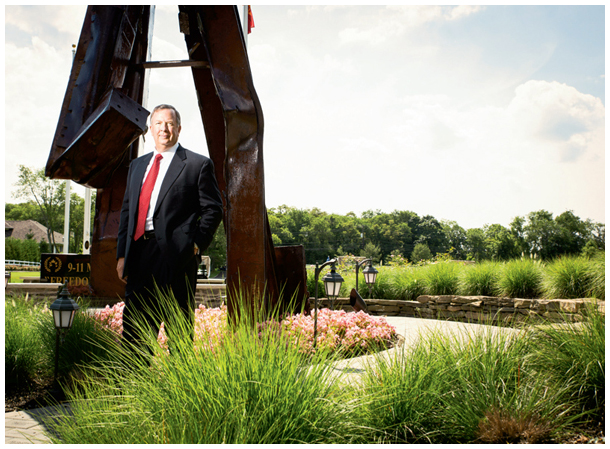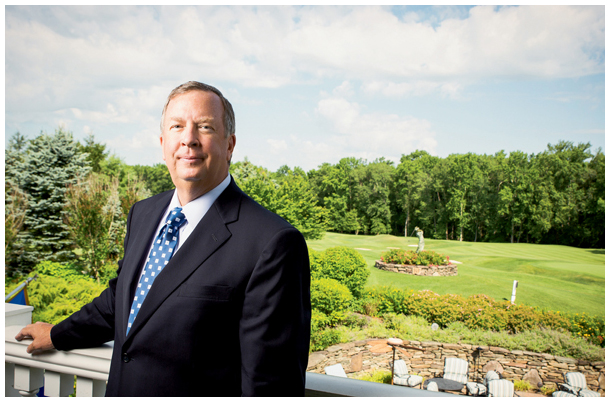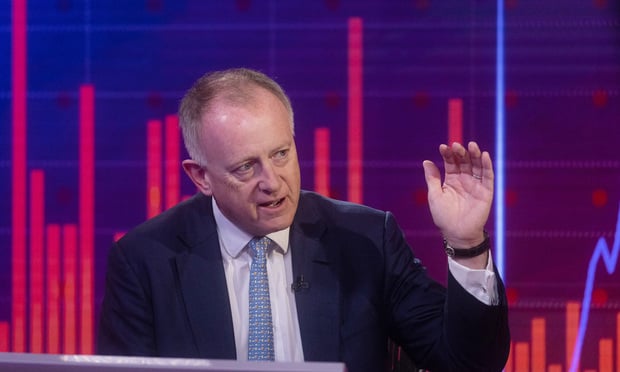The insurance business can be a funny thing. While it has provided fulfilling careers for thousands of people, so very few of them sought it out as a vocation. Even many of the industry's most successful players will tell you that selling insurance wasn't their first choice for a career, or that it was done on a lark until something better came along.
Andrew C. Harris is one of them.
The immediate past president of the National Association of Professional Insurance Agents (PIA National), Harris serves on the executive committee of the national board of directors, is vice president of PIAPRO, PIA's agent-owned captive insurance company, and is PIA National's liaison to the Insurance Services Office.
His 38 years' experience in insurance sales and agency management includes more than two decades spent as president and CEO of Liberty Insurance Associates of Millstone Township, N.J., a multi-line agency with more than 40 employees.
So naturally, in college, he majored in biology and chemistry.
"I was a pre-med major, actually," says Harris, a Livingston, N.J., native. "I didn't get into medical school, so I decided I would work for a pharmaceutical company since I had the background for that."
He went to a Manhattan-based headhunter to see if he could be placed with one of the larger pharmaceutical companies. The recruiter sent him on a drill interview with Liberty Mutual, which was looking for salesmen. "I said, 'Who are they?' He said it was an insurance company, and I said, 'Oh God no, no. I have no interest in that at all.'"
 Upon the recruiter's urging, Harris went on the interview anyway. "It wasn't at all what I was expecting," he says. The position was in commercial sales and national accounts out of Liberty Mutual's East Orange, N.J., office. They wanted him, and he took the job. "I knew nothing about insurance, but I was fascinated by how I would learn about insurance and how it relates to every business on earth."
Upon the recruiter's urging, Harris went on the interview anyway. "It wasn't at all what I was expecting," he says. The position was in commercial sales and national accounts out of Liberty Mutual's East Orange, N.J., office. They wanted him, and he took the job. "I knew nothing about insurance, but I was fascinated by how I would learn about insurance and how it relates to every business on earth."
In those days, he recalls, the carrier boasted one of the best training programs in the industry. "They would put you through very structured training," he says. "You'd go away and spend weeks in the classroom, then you'd go back to your field office, work with your sales manager, get some sales experience and then go back [to school] again. Then go back to the field, and then go back again."
After about six months of this boot-camp approach, "you really understood insurance," he says, acknowledging the valuable, cornerstone insight he gained during that first half-year in the business.
"I owe everything in this business to them," says Harris, who still has friends whom he met at Liberty Mutual 38 years ago. "As a matter of fact, several of us, after we had left Liberty and went after the agency brokerage field, got together again and formed Liberty Insurance Associates, which is our firm."
The Next Generation
The tipping point for striking out on his own, Harris says, was learning a bit more about the world of compensation. "I was very successful there and did very well," he says. "The only reason why I left was that Liberty Mutual was very new-business oriented and as a salesman you were not paid renewal commissions.
"Over time I got to know people on the agency/broker side and they were telling me about their renewals, and I went, 'What renewals?'" he laughs. "Suddenly the light went on and I realized there's a whole different world in insurance if you were paid renewal commissions as well as new business commissions." For example, in those days, property risks were written as three-year policies; if the client didn't renew in year two or year three, the carrier charged you back your commission.
"That was the reason many people left and ventured into the agency/broker community," he adds. That spirit of entrepreneurship, he says, "is one of the big things that over the years we've been trying to recapture in the independent agency system— bringing that next generation into our business."
 Indeed, one of the biggest challenges in the independent agency system today is finding a way to attract young people out of college and make them realize they can learn a trade. "I'm speaking primarily about commercial insurance, but insurance isn't something that you just sort of drop into and say, 'OK, I'm an expert,' although some people claim to be," he says. "It's taken me 38 years.
Indeed, one of the biggest challenges in the independent agency system today is finding a way to attract young people out of college and make them realize they can learn a trade. "I'm speaking primarily about commercial insurance, but insurance isn't something that you just sort of drop into and say, 'OK, I'm an expert,' although some people claim to be," he says. "It's taken me 38 years.
"I started with a CIC, and then got my CPCU designation, then ARM," he says, listing his designations, which—as is far more often the case than not among those who take the time and effort to achieve them—clearly mean a lot to him. He next earned his CRM and then AIS, all with the goal of seeing insurance service "specifically from the eyes of the customer, and approaching each moment of truth in the interactions you have with the consumer."
Approximately 70% of Liberty Insurance Associates' revenue is commercial insurance, broken down into three units: large, middle market and small. About 12% of the agency's business is in life, ancillary products, voluntary benefits, regular group benefits and wealth management, with the balance in personal lines and unique business.
"Our mission is to solve problems in every way we can—and to understand that most times in insurance claims, it's not just a financial claim, it's a personal problem that people have; it's something that affects them personally," he adds. "You can't ever lose sight of that."
Rethinking Customer Service
Interactions with clients and even prospects have changed drastically over time, says Harris. These days, everyone with a question wants an answer yesterday.
"The expectations of customers now are, 'I need information now, I want it correct the first time, and I want you to deliver it when and how it's comfortable for me,' which obviously, over the course of my career has changed dramatically," he explains. If you don't get back to a client or a friend, or even a contemporary the same day, he adds, they're prone to think something's happened to you.
Around 2003, the agency began routing small commercial- and personal-lines customers directly to their respective carriers' service centers—a decision made after a good, hard look at the agency's processes. "Our internal client-management system allowed us to look at the transactions that we had with our clients," he explains. (Every time Liberty Insurance Associates receives a call, letter, email, or any other type of interaction with a customer, it's recorded and filed in the agency's system.)
Once Harris and co. were able to look at the transactional log of each client, "we realized our cost drivers were not necessarily those clients who were generating our revenue, and we were actually giving short shrift to our best customers and over-servicing the demands of customers who were much smaller, but had a much higher demand for transactional business," he says. Smaller clients, for example, often need numerous certificates of insurance, which takes time—and often, the client needs them immediately.
"The centers are set up to handle those calls very efficiently and effectively and can do it cost-effectively. The [client] can still call us on any issues and we're always available," he adds.
When it comes to the agency's social media strategy, "I decided long ago that I'd be an expert at what I know, and I let other people that know more than I do, handle those," says Harris.
His son, Andrew, handles much of the technical aspects of the agency, including its social media use of Facebook, Yelp, LinkedIn, Twitter and other platforms, and about six months ago the agency started using Astonish as its marketing and sales platform to great effect, he adds.
"Now we can send out campaigns, and if someone clicks on a link, that information is sent back to us and we capture that information," he says. If a particular producer is responsible for marketing that campaign, he or she will receive a text or an email. "We actually have it set up for text message, so if someone says, 'Yes, I want a quote,' or 'Call me,' within moments they're getting a text saying, "You can call X at this number, he's interested in giving you a quote.'"
Additionally, a major investment in automated services has linked the producers' iPads directly to the agency's internal processing system, allowing for fast response time remotely. The system also sends reminders to both producers and clients when coverage is near expiration and at other milestones.
Such technological tools, combined with deep client-facing knowledge an independent agent provides, are a one-two punch against the direct writers of the world.
"The pathway for the independent agency is becoming clearer because of the great marketing level impact that electronic marketing has had," Harris says. "We can now start recapturing market share that is taken away from us in print, television, radio, billboards and magazines. You know some [of the majors'] advertising budgets are incalculable, but for a very modest investment, you can be right up there with them now.
"There isn't a customer that we have who can't probably buy insurance at a lower price, if they looked hard enough," he adds. "So our challenge is to show our customers that the money they're paying is well spent, and that the value they're getting is worth it."
A Leadership Role
Harris would certainly seem to know a thing or two about value—and leadership. In 1996 he was selected as PIA of New Jersey's Agent of the Year, and received a joint resolution from the New Jersey Senate and Assembly recognizing this achievement. He served as President of PIA of New Jersey from 1998 to 1999. In June 2006, he received the PIA of New Jersey's Distinguished Insurance Service Award. In addition, he has served on the Regional Agents Advisory Boards of CNA Pacer, Crum & Forster, Hanover, One Beacon and the Harleysville producers councils.
Nationally, he has served on the Crum & Forster National Agency Council and Harleysville Insurance Co. National Board. From 2003 to 2008 he served as president of the Proformance Insurance Co. in Freehold, N.J.
His accomplishments at the state level are no less impressive: Harris was appointed by the governor of the Garden State to the Department of Banking and Insurance Disaster Response Plan Development Group, and is a member of the Department of Banking and Insurance Study Commission and the New Jersey Insurance Commissioner's Insurance Education Advisory Committee, and he served on the Commissioner's Producer's Advisory Council for more than a decade. He also has served on the Board of Governors of the Windstorm Marketing Assistance Plan.
All of this while he's leading his own agency, of course. Which begs the question, what motivates a producer who's accomplished so much?
"I'm still focused on our [own] business and growing it, but as you get older in business you start to look and say, 'How can I give back and help the people who are where I was, many years ago, succeed and continue?'" he responds.
Part of that is making sure that up-and-coming independent agents have the same opportunities that he had, especially with regard to training.
"The most important thing right now is to have a platform for new agents to become truly independent and not just join a direct writer," he says, adding that organizations like PIA are uniquely positioned to help brand-new agents starting in the business.
It's no secret that many carriers no longer train new producers, and for independent agents, getting a leg up is critical—especially in the first three to five years of selling. Educational programs like those offered by organizations like PIA can provide the same cornerstone of knowledge that Harris received at Liberty Mutual.
"We'll give ongoing training even inside your own agency," he says of PIA, and will also help agents get appointments with carriers.
"In my entire insurance history, I have never asked another agent for help on anything and been rejected or denied," he says. "As an industry, we are the most incredible, benevolent competitors you can imagine."
Want to continue reading?
Become a Free PropertyCasualty360 Digital Reader
Your access to unlimited PropertyCasualty360 content isn’t changing.
Once you are an ALM digital member, you’ll receive:
- Breaking insurance news and analysis, on-site and via our newsletters and custom alerts
- Weekly Insurance Speak podcast featuring exclusive interviews with industry leaders
- Educational webcasts, white papers, and ebooks from industry thought leaders
- Critical converage of the employee benefits and financial advisory markets on our other ALM sites, BenefitsPRO and ThinkAdvisor
Already have an account? Sign In Now
© 2025 ALM Global, LLC, All Rights Reserved. Request academic re-use from www.copyright.com. All other uses, submit a request to [email protected]. For more information visit Asset & Logo Licensing.








